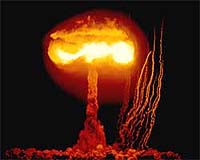 - - |
by Viktor Danilov-Danilyan
Global climate change defies forecasting. Unprecedented heat, floods, droughts and typhoons brought about by climate change cause tremendous damage. The number of such calamities has doubled over the last 10 years, according to the Russian Emergency Situations Ministry.
Some experts think there is nothing to worry about-periodic alterations in the climate are normal. Some believe the general alarm is the result of a mere lack of knowledge. But then, the danger posed by climate change is no smaller than the danger posed by nuclear war, and we have to face and evaluate it, however vague it might appear.
There is no way to hide from global warming. In fact, the repercussions of climate change might be even worse because the entire climatic system will be thrown out of balance. The average surface temperature is going up, and so are annual deviations from it.
Natural calamities go hand in hand with warming. Disastrous floods are getting more frequent in Russia and many other countries. They account for more than half of weather-related dangers.
Floods alternate with droughts in European Russia's south. Heavy rains in spring and early summer cause floods, after which there is not a single raindrop for three months, destroying those crops that survive the floods.
The Kuban and Stavropol regions, Russia's breadbasket, permanently face this danger.
Economic disasters caused by natural calamities are becoming ever more frequent. The World Bank estimates Russia's weather damages, largely caused by climate change, at an annual 30-60 billion rubles, roughly $1-$2 billion.
Floods, usually caused by typhoons, are also frequent in the Russian Far East-the Primorye and Khabarovsk territories, Kamchatka, Sakhalin and the Kuril Islands. Winter floods are typical of the Arctic Ocean basin.
The spring inundation of the Lena, the largest Eurasian river, washed away the town and port of Lensk in 2001. The town was rebuilt on a new site. The evacuation and ensuing housing and infrastructural reconstruction cost an exorbitant sum.
Average warming in Russia due to anthropogenic factors is about one degree. In Siberia, it is four to six degrees-enough to shrink the permafrost area. Pernicious effects are visible even now, with the borders of the taiga, forest tundra and tundra itself receding northward-suffice it to compare space photographs from 30 years ago with the latest ones.
The change endangers oil pipelines and the entire infrastructure of Siberia's west and northwest. Permafrost thawing has not yet achieved a scale that poses a threat of infrastructural accidents-but we can never be too careful.
Warming also poses a great danger to regional flora and fauna, which have to undergo a very painful adaptation process. Considerable warming will result in changes to ecosystems, for example, broadleaved woods ousting the coniferous taiga. Warming makes the climate unstable, with bitter frosts and sultry summers, which is bad for both forest types-conifers suffer in the heat, while broadleaf trees do not survive frosty winters. So the biota will face many shocks before the climate stabilizes.
Warming is also a major problem for marshes and the permafrost, which will release accumulated methane and carbon dioxide gas. Gas hydrates from the northern sea shelf will vaporize. All that will drastically increase atmospheric greenhouse gas concentrations, spurring the warming on in a vicious circle.
The environmental balance has already been upset. Many plants and animals will suffer. In particular, the polar bear's habitat is doomed to shrink, and millions of wild geese, eiders, brants and other birds will lose half of their nesting grounds in a matter of 20-40 years. A three to four degree warming may interrupt the food chain of the tundra ecosystem, lead to the extinction of many species.
Invasions of ecosystems by alien species are one of the worst manifestations of global warming. Thus, locusts are moving north, and have become frequent guests in the Samara Region on the Volga and certain other areas. The mite habitat is rapidly expanding, too. Pests migrate north far quicker than the border between, for example, the taiga and the forest tundra shifts. Once they find themselves in a foreign ecosystem, pests become gangster species, crowding out the native biota with dynamic multiplication. Climate change thus brings epidemics in its wake. Subtropical malarial mosquitoes now feel at home in the area around Moscow.
Scientists who welcome warming as a boon for Russian agriculture are entirely wrong. True, the vegetation period is becoming longer-but this benefit is outweighed by the hazard of spring frosts destroying young crops.
Another argument in favor of warming is the energy that would be saved by a reduced need for heating. But then, the United States uses more energy for air conditioning than Russia does for heating even now.
How can humankind fight climate change? It's no use opposing Nature-but we can reduce pollution and other adverse environmental effects brought about by humankind. The problem appeared on the political agenda in the 20th century.
The World Meteorological Organization and the United Nations Environment Program established the Intergovernmental Panel on Climate Change in 1988, which brought together several thousand scientists, including Russians.
The UN Framework Convention on Climate Change entered into force in 1994. One hundred and ninety countries have joined it since then. The document determines the scope of the international partnership to deal with the issue, whose first achievement was the Kyoto Protocol of 1997. Intensive economic activities are surely bad for the climate. That is why the protocol demands a reduction in air pollution caused by methane, carbon dioxide and other gases.
Russia ratified the protocol along with another 166 countries, and has been true to its pledge. It is introducing new, clean technologies for industry and everyday life. Cleaner air will help reverse the trend of climate change.
Viktor Danilov-Danilyan is director of the Institute of Water Problems, Russian Academy of Sciences.
Original article posted here.























No comments:
Post a Comment